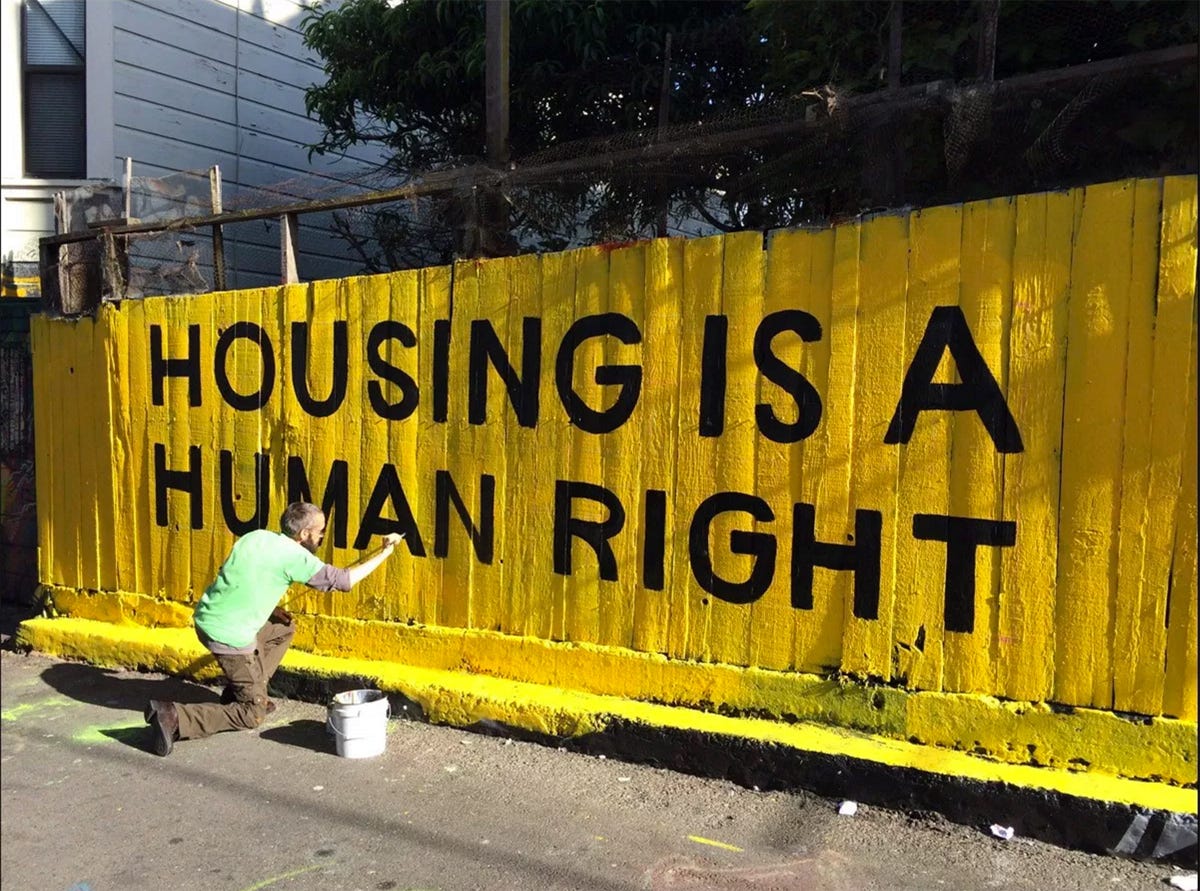Image from Wikimedia Commons
As we all take a deep breath and consider how best to respond to this month’s disastrous presidential election results, it seems a good time to provide some updates. Here is the latest on some of the housing matters we have covered in the sixty-plus posts published during this newsletter’s two years of operation.
Tenant Union Movement Update:
The tenants who launched the history-making rent strike in Kansas City are in their 47th day of withholding rent. The Federal Housing Finance Authority has responded to the strike by tenants at Quality Hill Towers and Independence Towers by providing $1.35 million for much-needed repairs. But the tenants’ demands, especially a national 3% rent cap on all buildings that receive federal financing, have not been met. So they remain on strike.
“If the federal government is going to be involved with private businesses and financing their profits, we expect the government to exercise every available avenue to protect tenants’ rights,” says Tara Raghuveer, the director of KC Tenants. “If the government is going to be involved in backing a loan, that should come with strings attached.
Rent Control Update:
We have written about the benefits of rent control and corporate landlords’ repeated attempts to use the courts to strike down New York’s successful rent control laws. Earlier this week, the U.S. Supreme Court refused again to hear the landlords’ latest challenge.
This good news was blunted somewhat by Justice Neil Gorsuch casting a vote in favor of hearing the challenges. Gorsuch is a distinct minority for the moment. But there is always a risk that the most pro-corporate Supreme Court in history could walk back the clear and compelling precedent upholding communities’ ability to limit rent price-gouging.
Corporate Landlord Update:
Speaking of corporate landlords, I recommend a new report by the Institute for Policy Studies and Popular Democracy, “Billionaire Blowback on Housing.” “Huge pools of wealth, controlled by a small segment of wealthy individuals and their investment arms, are supercharging existing problems of gentrification, homelessness, unaffordable rental housing, and out-of-reach homeownership” the report begins. It goes on to describe in detail billionaires’ roles in displacing communities of color, keeping homes vacant to maximize profits even while people are unhoused, and spiking rent while neglecting maintenance.
A frightening example of that neglect of basic maintenance is provided by Thomas Birmingham in an October 23rd In These Times article, “As Corporate Landlords Spread, A Mold Epidemic Takes Root.” Citing the research that shows corporate landlords have very poor records for providing safe and healthy housing, Birmingham dives deep into the unsafe conditions in government-subsidized, corporate-owned housing in New Haven, Connecticut. A particular problem is the widespread household mold that so many of our Indianapolis tenant clients struggle with as well.
“When tenants breathe in allergens like mold spores, (pediatrician and allergist Dr. Pamela Kwittken) explains, lungs become inflamed, causing airways to spasm and close, and mucus secretions increase, quickly clogging up their respiratory systems.” Birmingham writes. “Continuous exposure can cause chronic asthma, a disease with a wide range of severe consequences, from perpetual school absences to, for thousands every year, death.”
You can read the full article on In These Times’ website here.
Housing at the Ballot Box Update:
The good folks at Shelterforce once again perform a great service by surveying three dozen housing-related ballot measures voted on earlier this month. “Overall, we found that the outcomes were largely positive,” they wrote on November 7th. More than $1 billion in annual funding for housing was approved by voters in Los Angeles, Colorado, New Orleans, and North Carolina. Check out the Shelterforce article for more details about the wins and the losses.
Also, in the South Shore neighborhood in Chicago, residents advocating for a community benefits agreement that we wrote about in October earned a big win on Election Day. A full 89% of voters in targeted precincts cast their ballots in favor of their alderperson and mayor supporting the ordinance that would protect low-income homeowners and renters and reserve city-owned vacant lots for affordable housing.
I am glad to end this post with some positive news, especially since it represents some light and hope emerging out of an otherwise dismal Election Day. Hopefully, we can build on these wins as we collectively push toward safe, healthy, affordable housing for all.






I am determined to help solve the homeless problem, which I believe will make affordable housing available to a large part of the population, as well. Both are intertwined. Once you find a solution for one, it can't help but alleviate concerns for the other.